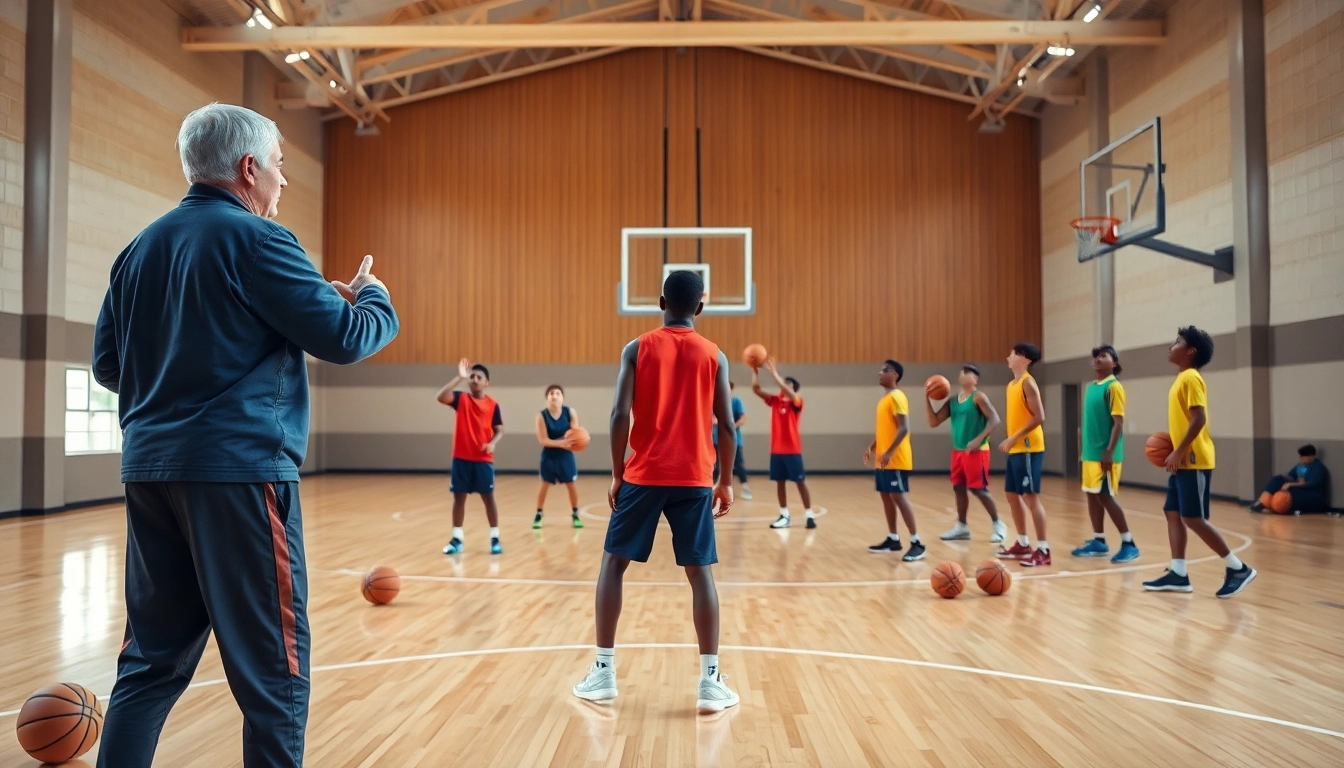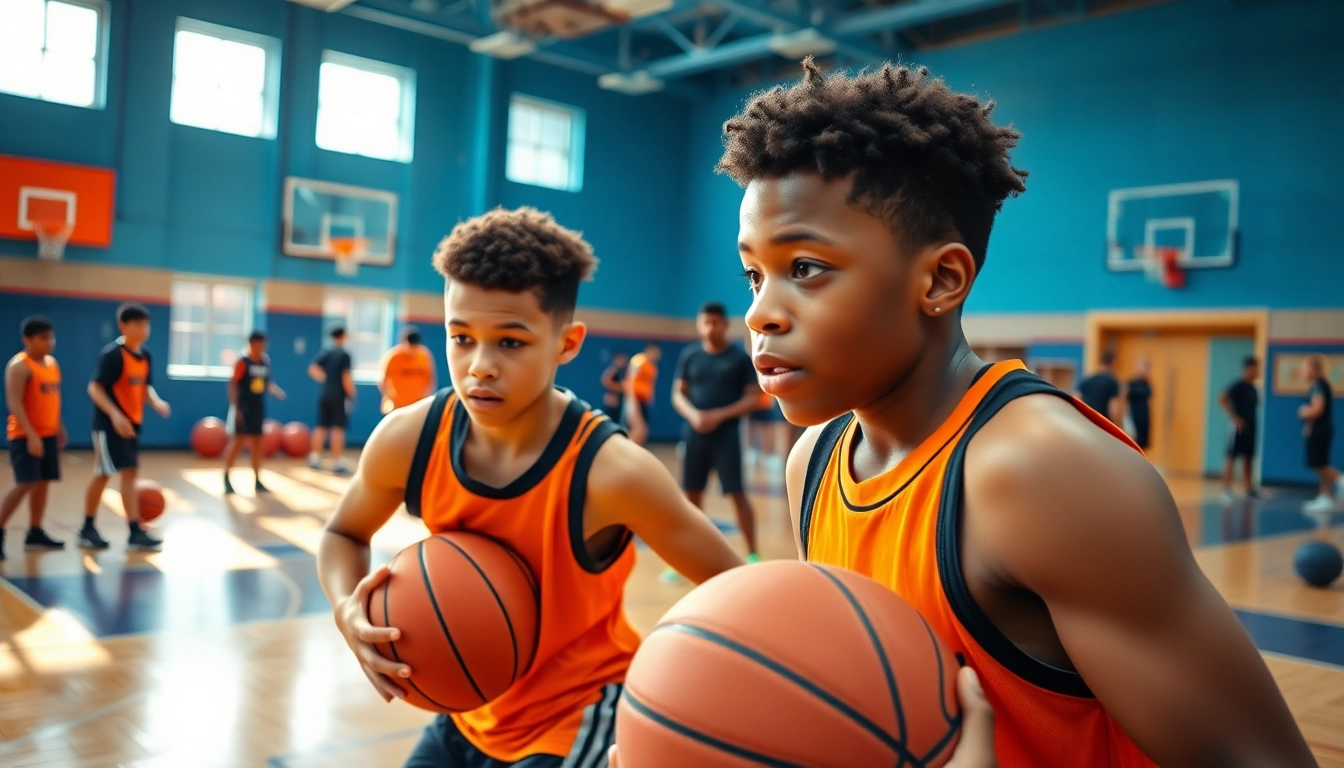Understanding Basketball Training Programs
What are Basketball Training Programs?
Basketball training programs are structured frameworks designed to improve players’ skills, strength, and overall performance in basketball. These programs often encompass a variety of training elements such as shooting drills, ball handling, defensive techniques, and conditioning exercises tailored to different skill levels and ages. They can be found in basketball academies, community centers, colleges, and sports facilities. Importantly, they are not solely for professionals; anyone looking to improve their game can benefit from these training sessions, making them an essential resource for players at all levels. To find the best options available, many athletes search for basketball training programs near me, ensuring they can train conveniently while receiving high-quality instruction.
Benefits of Local Basketball Training Programs
Participating in local basketball training programs offers numerous benefits. Firstly, these programs are typically led by experienced coaches who have played the game at competitive levels. This access to professional guidance helps players refine their techniques and approach to the game.
Moreover, local training provides opportunities for players to engage with peers who share similar interests. This can foster a sense of community, encouragement, and healthy competition. Training sessions often include scrimmages where players can apply newly learned skills in game situations, helping to solidify their understanding and execution.
Additionally, training in your neighborhood can increase the likelihood of consistency. Reduced travel times mean you can attend more sessions regularly, crucial for improving one’s play. Lastly, many training programs also integrate physical conditioning and mental toughness training, essential components for any athlete looking to excel in high-pressure environments.
Choosing the Right Program for Your Skills
Not all basketball training programs are created equal. When selecting a program, assess your current skill level and goals. Beginners may benefit from programs focusing on fundamental skills, such as dribbling and shooting. In contrast, experienced players might seek advanced training that focuses on game strategies, position-specific skills, and competitive drills.
It’s also essential to consider the coaching style of the program. Some coaches emphasize strict methodologies focusing on fundamentals, while others might adopt a more flexible and motivational approach. Look for programs that specialize in your position—coaches who understand the nuances of being a point guard, center, or shooter can make a significant difference in your development.
Lastly, reading reviews and testimonials from past participants can provide insights into the effectiveness of the program. Engaging with community forums or local basketball groups can further guide you in making an informed decision.
Key Features of Effective Basketball Training
Essential Training Techniques and Drills
Effective basketball training incorporates a broad spectrum of techniques and drills designed to enhance specific skills.
- Shooting Drills: These include free throw practice, three-point shooting, and catch-and-shoot drills, where players practice receiving the ball and quickly taking a shot.
- Ball Handling Exercises: Drills that improve dribbling under pressure, cross-overs, and hesitation moves are critical for players at all positions.
- Defensive Skills: Techniques such as defensive slides, closeouts, and 1-on-1 defensive drills help players become more formidable on the court.
- Conditioning Workouts: These are integral to building the stamina needed for high-level play, involving sprinting, agility drills, and strength training.
The incorporation of technology, like video analysis, can also provide players with instant feedback on their mechanics, pinpointing areas for improvement. Moreover, attending workshops alongside regular sessions can further expand a player’s tactical knowledge and situational awareness.
Importance of Personalized Coaching
Personalized coaching is at the heart of effective training programs. Not only do personalized programs cater to individual skill levels and goals, but they also account for unique learning styles. A well-rounded coach will adapt their teaching techniques, create tailored conditioning programs, and provide specific feedback to each player.
Personal coaching can help players identify their strengths and weaknesses, ensuring training is focused on enhancing the player’s game holistically. This one-on-one interaction builds confidence, as athletes receive encouragement and direct input from their coaches, understanding exactly what they need to work on.
Moreover, building a rapport with a coach means players are more likely to remain engaged and motivated to push beyond their limits. This fosters an environment conducive to growth, allowing players to explore their potential and pursue excellence on and off the court.
Building Mental Toughness Through Training
Mental toughness is often what separates great players from average ones. A significant component of basketball training involves developing resilience, focus, and confidence. Coaches can instill mental toughness through various strategies, including setting challenging but achievable goals, implementing pressure situations in practice, and emphasizing the importance of positive self-talk during training.
Visualization techniques, where players mentally rehearse game situations, can also enhance performance under pressure. Coaches might challenge players by simulating game scenarios or putting them in high-stakes situations to help them manage their emotions during real games.
Additionally, understanding that failure is part of the growth process is vital. Programs that create a supportive atmosphere allow athletes to learn from mistakes without fear of judgment, reinforcing the idea that setbacks can fuel future successes.
How to Find Basketball Training Programs Near Me
Utilizing Online Resources and Platforms
The internet is a powerful tool when searching for local basketball training programs. Websites dedicated to sports and local facilities often provide databases of available options. Online resources like social media platforms, community forums, and sports networks allow players to search for training sessions and academies in their area. Websites like Google Maps can also help pinpoint nearby facilities and training programs, allowing players to compare distance, reviews, and availability.
Registration platforms like Eventbrite or specialized sports sites can showcase upcoming camps and training sessions, often including reviews from previous attendees. This plethora of information can help players gather data and identify options that best suit their needs.
Evaluating Local Basketball Academies
Once you’ve identified potential programs, it’s important to evaluate each academy. Visiting the facilities can give you a sense of the environment—are the courts well-maintained? Are the coaching staff qualified? Attending an introductory session or observing a practice can provide insight into the training style and player dynamics.
Consider the academy’s focus—is it about skill development, team cohesion, or competitive levels? Additionally, ask about the coach-to-player ratio; more personalized attention often leads to better training outcomes. Look for testimonials or talk to parents of current athletes to assess the program’s effectiveness.
Another aspect to consider is the academy’s registration policies and costs. Understand the financial commitment involved and weigh it against the quality and outcomes of training provided. Many programs offer flexible payment plans or scholarships, so it’s worthwhile to inquire.
Engaging with Community and Networking
In any sport, community plays a crucial role in finding opportunities for training and growth. Engaging with local leagues, joining basketball forums, or participating in community events can lead to valuable connections. Coaches and trainers often have referrals for reputable programs and can provide recommendations based on your skills.
Consider joining local basketball clubs or teams that offer training sessions as part of their programs. These groups frequently organize workshops, group sessions, and tournaments that can help hone your skills while fostering camaraderie with fellow players.
Networking with other athletes and parents may also open doors to discover informal training sessions or mentorship opportunities that could further enhance your development.
Success Stories from Basketball Training Programs
Testimonials from Athletes and Parents
Personal success stories can provide encouragement and perspective on the impact of training programs. Athletes and their parents often share stories highlighting how dedicated training led to improved skills and more confidence on the court. Testimonials often include details about skill improvements or newfound enjoyment in the game.
For instance, young players might articulate their excitement over making their first school team or achieving personal records during tournaments after participating in local camps. A parent might recount how personalized coaching influenced their child’s passion for basketball, noting increased attendance at practices and newfound eagerness to learn more.
Case Studies: Program Impact on Player Development
In-depth case studies provide quantifiable insights into how effective basketball training programs have transformed players’ abilities. For example, a case study might track a player who entered an academy with little experience but graduated as a team captain with significant accolades.
Metrics such as shooting percentage, assists per game, and defensive turnovers can illustrate concrete improvement. Coaches could analyze data from evaluations at different training stages to emphasize growth areas, both statistically and skill-wise, demonstrating their program’s success in developing well-rounded athletes.
How Training Translates to Game Performance
Ultimately, effective training proves its worth through performance in games. Players who have undergone intense training typically exhibit enhanced skills, better decision-making abilities, and improved physical conditioning. Coaches can track statistics like points scored, turnovers reduced, and overall player efficiency ratings to illustrate the connection between rigorous training and actual game results.
Moreover, training equips players with tactical knowledge, improving their understanding of on-court decisions. Players often report better teamwork and communication, allowing for more fluid gameplay, showcasing that successful training extends beyond individual skills to team dynamics.
Getting Started with Basketball Training
Setting Goals for Your Training Journey
Before embarking on your training journey, establishing clear, achievable goals is vital. Consider what you want to achieve—whether it’s improving your shooting percentage, enhancing your ball handling, or preparing for competitive play. Setting SMART goals (Specific, Measurable, Achievable, Relevant, and Time-bound) helps maintain focus and gives clear milestones to strive for during training.
For younger players, goals might include making a specific team or enhancing their skills to keep up with peers. More advanced players may aim to increase statistics from the previous season or work towards earning a scholarship offer from a college program.
What to Expect in Training Sessions
Comic sessions can vary, but there are common threads that players can expect in most programs. Typically, sessions begin with warm-ups, followed by skill drills targeting different facets of the game. Training might include shooting practice, ball handling drills, defensive strategies, and team-based exercises.
Be prepared for a blend of individual work focused on skill development and more extensive team practices that emphasize playing styles and overall team cohesion. Trainers may incorporate video analysis and feedback sessions to help players understand their progress and areas requiring further work.
Players should expect to engage not just physically but mentally, with focus segments aimed at developing game intelligence, strategic thinking, and player roles. Adaptability to various situations and stresses foster an environment that prepares players fully for competitive scenarios.
Maintaining Progress After Training Completion
After completing a training program, continued development is crucial. Maintaining skills and conditioning involves consistent practice and potentially scheduling follow-up sessions for advanced training. Establishing a practice routine can ensure skills remain sharp and players continue to improve.
Players should also seek to apply their skills in competitive environments such as local leagues, school teams, or informal games with friends. The experience gained in game situations is invaluable, allowing players to adapt and leverage their training effectively.
Additionally, athletes can continue personal development by engaging with fitness routines that focus on strengthening and conditioning, enabling them to maximize their athletic potential. Setting new goals regularly can keep the drive alive, ensuring progress remains a continuous journey.


